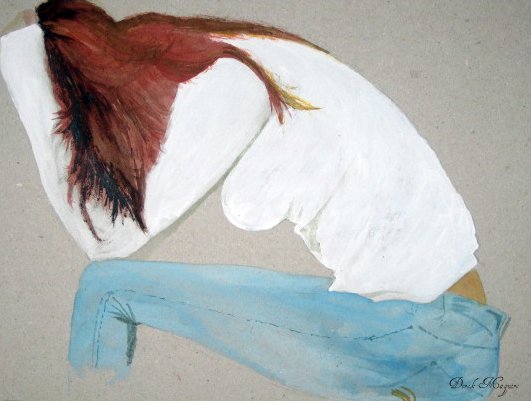
Editor’s note: This article represents one small sliver of anxiety, depression and addiction. Please use it to help inform your perspective or contribute to constructive discussion if you wish, but consult a licensed doctor, psychiatrist or psychologist regarding any changes to your health care plan. elephant journal is not designed to, and should not be construed to, provide medical advice, professional diagnosis, opinion or treatment to you or any other individual, and is not intended as a substitute for medical or professional care and treatment.
.
.
As I write this I am 18 months clean and sober.
I was addicted to alcohol and sleeping pills when I booked myself into rehab. I was also taking an anti depressant. It made me feel even more disconnected from myself.
The years of substance abuse, my unhinged nutritional levels, high toxicity and my lack of connection and purpose created misery within and led to depression. A drug to help the uptake of serotonin was going to do very little for me in the long run, this I understood. I needed and wanted to get to the root of my problems.
I had a fierce determination to leave rehab drug free. The psychiatrist did not support this. I was told I was irresponsible and that I would most likely diminish my chances of a full recovery without the use of prescribed medication. I was astounded at how freely highly addictive drugs were prescribed in my rehab facility, considering it was viewed as a more holistic establishment.
To me, it seemed as though one addiction was being replaced with another, however, I realize that a very small percentage of individuals actually do need these drugs.
So what is the answer then?
Believe it or not, it’s non–addictive, available without prescription, safe, effective and not commonly mentioned by your doctor for the treatment of your anxiety, depression and addiction.
The answer is simple. It’s a vitamin.
A vitamin which cannot be patented, thus pharmaceutical giants cannot profit from its popularity or credibility. Big Pharma controls what your doctor prescribes and greatly influences your doctor’s perceived perception of truth. Big Pharma will not endorse or support the findings of a vitamin, no matter how extensive the research is.
Just look at what happened with Linus Pauling and his work on orthomolecular medicine, megavitamin therapy and dietary supplements. None of the latter gained acceptance in the mainstream scientific community. In my opinion and many other doctor’s opinions, he was shut down for his groundbreaking work on high dose vitamin C therapy.
The message is clear to me; compete with a multi-billion dollar drug industry and you’re most likely going to be stopped.
The vitamin I’m referring to is niacin, or B3. Many people have little idea how many illnesses are caused by too little niacin, and basically no one realizes just how many illnesses can be cured with megadoses of niacin.
Much of my understanding about this nutrient I discovered thanks to the research of Dr. Abram Hoffer. Dr. Hoffer was a Canadian biochemist, physician, and psychiatrist. According to him, megavitamin therapy and other nutritional interventions are potentially effective treatments for many health disorders. Dr. Hoffer was the world authority on niacin.
Niacin is a small water soluble molecule that plays a role in over 500 reactions in your body. Interfering with any of these vital reactions will cause disease. Niacin usually causes a “flush” a few minutes after it is taken due to it’s vasodilation effects. The capillaries are dilated and the blood flow through the organs is increased. There is an internal increase in the blood flow as well as in the skin, which may last up to several hours. Non-flush preparations are available.
So, how does niacin work to help alcoholism and other addictions?
Helping an addict get well, by not adding more addicting drugs—even though they may be socially acceptable and easier to control, is something I feel very strong about.
Many alcoholics suffer from increased gastrointestinal permeability. This causes a decrease in antioxidant levels. A daily dose of 100mg of niacin restores gastrointestinal permeability when combined with abstinence and a proper diet.
Niacin is the single most important and reliable treatment for alcoholism—and it is much safer than any of the modern psychiatric drugs. The alcoholic’s body needs proper nutrients in sufficient amounts to help restore, revive and rewire his or her entire being.
Need more proof? Look at the Founder of Alcoholic Anonymous, William Griffin Wilson (Bill W.1895-1971.)
“Bill W. is the greatest social architect of the 20th century” – Aldous Huxley.
Bill W, the founder of AA, was one of the first alcoholics/addicts to benefit from niacin. After his last drink he suffered from decades of anxiety, fatigue, and depression but was still able to do his remarkable work, which helped millions of drug addicts.
“The man who would co-found Alcoholics Anonymous was born to a hard drinking household in rural Vermont. In the 1920’s, Wilson achieved considerable success as an inside trader on Wall Street, but a combination of drunkenness and the stock market crash drained what was left of his fortune and his capability to enjoy life. Hard knocks, religious experience, and a growing sense that he could best help himself by helping other alcoholics led Bill to create one of the world’s most famous introductions: “My name is Bill W., and I’m an alcoholic.”
Even as AA slowly grew, many of Bill’s financial and personal problems endured, most notably depression. I met Bill in New York in 1960. I introduced him to the concept of megavitamin therapy. Bill was very curious about it and began to take Niacin, 3000mg daily.
Within a few weeks the fatigue and depression that had plagued him for years were gone. He gave it to 30 of his close friends in AA. Of the 30, 10 were free of anxiety, tension and depression in one month. Another 10 were well in two months. Bill then wrote “The Vitamin B3 Therapy,” and thousands of copies of this extraordinary pamphlet were distributed.
As a result, Bill became unpopular with the members of the board of AA International. The medical members, who had been appointed by Bill, knew vitamin B3 could not be as therapeutic as Bill had found it to be. I found it very useful in treating patients who were both alcoholic and depressed.” -Dr. Abram Hoffer.
High dose vitamin therapy works best in combination with the steps of AA/NA. As Bill W. experienced, niacin helps addicts recover from anxiety, fatigue and depression. Relieve these symptoms and the addict’s need to use alcohol or drugs diminishes greatly. For less healthy people who become addicted, they maintain the addiction by self medicating in order to prevent the withdrawal effects.
It is simple really: a nourished body is biologically less likely to be an addicted body with symptoms of anxiety and depression.
Niacin has also been shown to relieve anxiety.
The first report of niacin’s anti-anxiety effects featured in 1949, when it was reported that it was synergistic with some prescribed drugs. Dr. Hoffer found that it had anti-convulsive effects if combined with anti-convulsants, and it was possible to achieve better control with less sedation by adding niacin to the anti-convulsant program.
More niacin, less need for the drug, in other words: niacin means less need for anti-anxiety drugs and depression medication. Both are highly addictive and toxic because the withdrawal effects are so severe and prolonged. Physicians concerned about the use of these drugs could study Dr. Hoffer’s work. They will be reassured that megadose vitamin therapy for anxiety is much more effective without the use of dangerous drugs.
Niacin is also very effective in the treatment of:
Ageing
Allergies
Alzheimer’s Disease
Cardiovascular Disease
Cancer
Cholesterol
Detoxification
Fatigue
Migraine headaches
Multiple sclerosis
Post Traumatic Stress Disorder
Raynaud’s Disease
Schizophrenia
Viral Illnesses
I knew I could heal my broken body with less toxic and more sustainable natural methods, regardless of what the psychiatrist said.
Instead, my most rewarding wellness journey began. I was on a personal quest to restore and revive my toxic, run down being.
Six weeks after rehab—which helped me enormously as far as therapy was concerned—I was drug free, sleeping naturally and I had no anxiety or depression. I experienced first hand the effects of high dose vitamin therapy in combination with mainstream treatment options.
My life filled with meaning once more.
I take niacin and other supplements every day of my life. I am not reliant on any chronic psychiatric drug. I hope and trust, day by day, that I will continue to heal myself in this manner.
Author: Irma Shutte
Image: Derek Maquire/Flickr
Editor: Deb Jarrett






Read 4 comments and reply